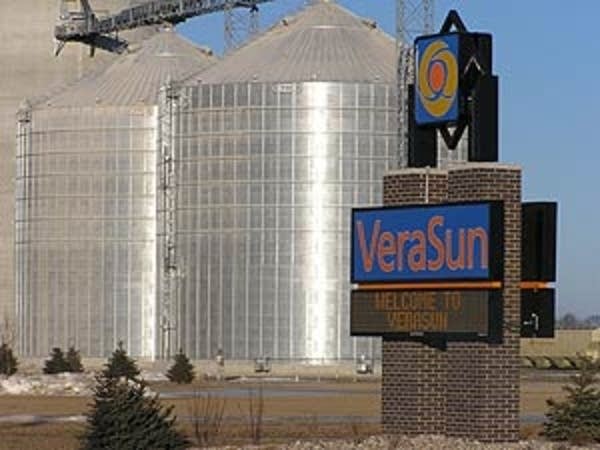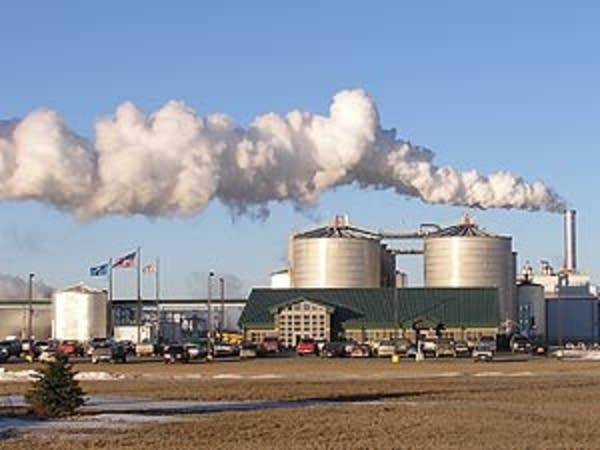High corn prices create huge losses in ethanol industry
Go Deeper.
Create an account or log in to save stories.
Like this?
Thanks for liking this story! We have added it to a list of your favorite stories.

VeraSun Energy started this year with high expectations. The Sioux Falls based company, with 14 plants in operation, bills itself as one of the world's largest ethanol producers.
In May, VeraSun announced a first quarter profit despite rising corn prices. During a conference call with investors, CEO Don Endres was upbeat.
"We're very optimistic about the future of this industry," said Endres. "The VeraSun team has great confidence in our strategy and our ability to execute on the opportunity."

But even as Endres was laying out a bright future, at least one part of the company's business strategy was in big trouble. When contacted, VeraSun officials declined comment for this story.
Turn Up Your Support
MPR News helps you turn down the noise and build shared understanding. Turn up your support for this public resource and keep trusted journalism accessible to all.
Pavel Molchanov is an energy industry analyst with investment bank Raymond James in Houston. He said, while the CEO was praising the company's strategy in May, VeraSun was in the middle of a bad wager.
"The company made a bet that corn prices were going to fall," said Molchanov. "And during that time actually corn prices were going through the roof."
Corn prices were spiking because of unrelenting rains in the Midwest. By the end of May, thousands of acres of farmland were flooded. Then June arrived, and it really started to rain. Much of Cedar Rapids, Iowa was under water and flood waters surged over Mississippi River dikes. It looked like the nation's corn crop was at risk. The prospects of lower corn supplies drove prices way up.

"Corn peaked right near the middle of the year at almost $8 a bushel, that's up from $5 a bushel in January," Molchanov said.
With corn reaching stratospheric highs, Verasun bailed out of its bet that corn would fall. But then, Molchanov said, VeraSun management made a crucial, and painful, decision.
"VeraSun actually turned around and went long corn," Molchanov said. "In other words, made a bet that corn would continue to increase in price, or at least be stable, and in fact that's when corn began to fall."
The rains stopped and farmers got almost two months of near perfect corn growing weather. The crop was saved. Prices fell back to what they had been early in the year and VeraSun's corn market position was in shambles. They were locked into contracts which had them paying almost two dollars more than they needed to pay, based on current market prices.
The company is expected to lose as much as $100 million dollars this quarter. VeraSun needs cash, but Molchanov said that's a difficult task with the nation in a historic credit crisis.
"Obtaining financing now, of any kind, has become extremely difficult, next to impossible in some cases," Molchanov said.
Last week VeraSun announced it would evaluate what it called "strategic alternatives". Most analysts believe that means the company is for sale.
VeraSun is not the only ethanol business in trouble. Denver-based BioFuel Energy owns two ethanol plants, including one in southern Minnesota at Fairmont. The company says it could lose nearly $50 million this year on its corn contracts.
Bruce Babcock, of Iowa State University, said the rapid growth of the ethanol industry has caused part of the problem.
"The very success of the ethanol industry is their own worst enemy," Babcock said. "That success has caused the corn price to rise to the extent that it's no longer profitable to make corn-based ethanol."
At least in some cases.
High corn costs combined with low ethanol prices have made it difficult to make money. VeraSun and others in the industry have scaled back expansion plans as a result. VeraSun even held off firing up some new plants because of the poor economic conditions, including one in southern Minnesota, in the community of Welcome.
With corn still trading at historically high prices, it remains to be seen whether the ethanol industry can regain it's profitable footing.
Dear reader,
Political debates with family or friends can get heated. But what if there was a way to handle them better?
You can learn how to have civil political conversations with our new e-book!
Download our free e-book, Talking Sense: Have Hard Political Conversations, Better, and learn how to talk without the tension.




